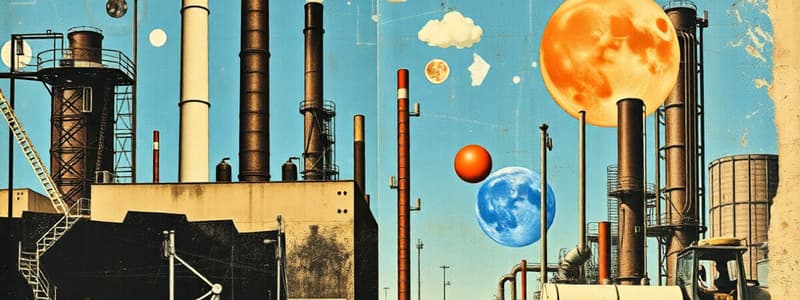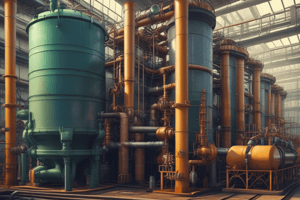Podcast
Questions and Answers
What is one of the main objectives of plant maintenance?
What is one of the main objectives of plant maintenance?
- To increase equipment complexity
- To reduce workforce training
- To promote rapid equipment turnover
- To minimize total maintenance cost (correct)
Which of the following industries is NOT commonly associated with maintenance services?
Which of the following industries is NOT commonly associated with maintenance services?
- Film production companies (correct)
- Hospitals
- Transport companies
- Restaurants
Which of the following is considered a failure type in equipment for production?
Which of the following is considered a failure type in equipment for production?
- Power outages in the office
- Overtime scheduling issues
- Supply chain disruptions
- Broken shaft in machinery (correct)
What is a common problem faced in maintenance management?
What is a common problem faced in maintenance management?
Which of the following is a benefit of effective maintenance practices?
Which of the following is a benefit of effective maintenance practices?
Which of the following is NOT a component of maintenance costs?
Which of the following is NOT a component of maintenance costs?
What is the primary goal of maintenance objectives within an organization?
What is the primary goal of maintenance objectives within an organization?
What is a key activity involved in short-run production maintenance systems?
What is a key activity involved in short-run production maintenance systems?
Which type of maintenance is characterized by addressing issues only after machinery has failed?
Which type of maintenance is characterized by addressing issues only after machinery has failed?
Under which classification of maintenance problems would 'excessive forced vibration' fall?
Under which classification of maintenance problems would 'excessive forced vibration' fall?
Flashcards are hidden until you start studying
Study Notes
What is Plant Maintenance?
- Plant maintenance is a critical service function that ensures the operational efficiency of plant facilities.
- It involves identifying and resolving faults in equipment and machines.
- Maintenance can be performed proactively to prevent breakdowns or reactively after a failure occurs.
Types of Maintenance
- Breakdown Maintenance (Corrective Maintenance): Repairing equipment after it has failed. This is the most reactive approach.
- Preventive Maintenance (PM): Scheduled inspections, cleaning, and minor repairs to prevent breakdowns and extend equipment life. It follows the principle of "prevention is better than cure."
- Predictive Maintenance (Condition-Based Maintenance): Monitoring equipment performance in real time to identify potential issues before they become failures. This utilizes various monitoring devices, such as vibration sensors and temperature gauges.
- Routine Maintenance: Regular inspections, cleaning, and lubrication of equipment to maintain its functionality.
- Scheduled Maintenance: Planned work to overhaul machines, change fluids, or clean tanks.
Importance of Plant Maintenance
- Dependability of Service: Ensures equipment reliability, minimizing disruptions in production or customer service.
- Assured Quality: Consistent product quality achieved through well-maintained machines and equipment.
- Prevent Equipment Failure: Proactive maintenance reduces the likelihood of unexpected breakdowns and downtime.
- Cost Control: Prevents costly repairs and minimizes the need for costly replacement parts.
Problems in Plant Maintenance
- Lack of Management Attention: Inadequate focus on maintenance can lead to neglect and breakdowns.
- Inadequate Accounting: Lack of proper cost analysis and reporting can hinder investment in effective maintenance programs.
- Difficulty in Quantitative Analysis: Challenges in accurately estimating maintenance costs and times.
- Difficulties in Measuring Performance: Lacking appropriate metrics for evaluating the effectiveness of maintenance efforts.
Maintenance Objectives
- Align with Production Goals: Maintenance programs should support broader production goals related to cost, quality, delivery, and safety.
- Comprehensive and Specific: Clearly defined objectives and responsibilities for each aspect of maintenance.
Areas of Maintenance
- Civil Maintenance: Focuses on building construction and maintenance, including service facilities.
- Mechanical Maintenance: Addresses the maintenance of machines, equipment, transportation vehicles, compressors, and furnaces.
- Electrical Maintenance: Covers the upkeep of electrical systems, including generators, transformers, motors, and lighting.
Maintenance Costs
- Replacement or Repair Costs: Expenses for replacing or repairing faulty components.
- Loss of Output: Production downtime resulting from equipment failure.
- Delayed Shipments: Delays in delivering products due to maintenance-related interruptions.
- Scrap and Rework: Loss of materials and wasted effort due to poor equipment performance.
Total Productive Maintenance (TPM)
- Origin: TPM originated in Japan in 1971 as a comprehensive approach to machine availability and resource utilization.
- Objective: Increase production, employee morale, and job satisfaction while reducing downtime and costs.
- Focus: Integrating maintenance into the overall business process and emphasizing the importance of preventative and predictive maintenance.
- Benefits: Reduced waste, improved productivity, increased quality, and reduced costs.
Why TPM?
- Waste Avoidance: Minimizes waste and inefficiencies in a rapidly changing economic environment.
- High-Quality Production: Produces goods without compromising quality.
- Cost Reduction: Minimizes the overall costs associated with production and maintenance.
- Rapid Production: Enables production of small batch quantities in a short time frame.
- Defect-Free Products: Delivering defect-free goods to customers.
Studying That Suits You
Use AI to generate personalized quizzes and flashcards to suit your learning preferences.




